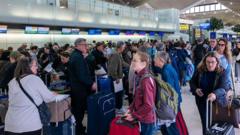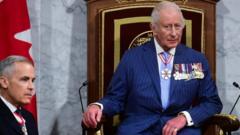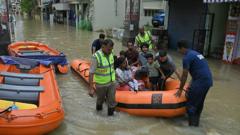Newark's air traffic controllers experienced a 30-second communication failure, resulting in numerous flight delays, cancellations, and workers taking trauma leave. This incident highlights the urgent need for updates in air traffic management systems and staffing.
Newark Airport Air Traffic Controllers Face Crisis Following Communication Blackout

Newark Airport Air Traffic Controllers Face Crisis Following Communication Blackout
A brief loss of contact at Newark Liberty International Airport raises serious concerns about air traffic safety and staffing shortages, leading to disruptions in flights.
Air traffic controllers at Newark Liberty International Airport encountered a significant communication challenge recentl, as officials confirmed a brief moment during which they were "unable to see, hear, or talk to" the planes they were managing. This incident, which occurred on April 28, caused numerous employees to go on trauma leave, further exacerbating ongoing staffing shortages and leading to widespread flight disruptions.
On Monday, more than 150 flights were reportedly cancelled, according to data from FlightAware, highlighting the extent of the fallout from the communication failure. U.S. Transportation Secretary Sean Duffy disclosed that contact was lost for “30 seconds,” emphasizing that this lapse did not immediately threaten the safety of the aircraft, as planes are equipped with alternative communication systems. Nevertheless, he described the situation as a troubling indication of the fragility within the air traffic management framework.
The Federal Aviation Administration (FAA) recognized the shortcomings in the current air traffic control system, characterizing it as antiquated and acknowledging its negative impact on the workforce. Following the communication loss, multiple controllers took leave due to the incident being categorized as a traumatic work experience, although specific numbers on those who left and the duration of the blackout remain undisclosed.
In recent days, United Airlines confirmed it has been cancelling an average of 35 flights per day on its Newark schedule, citing the airport's inability to manage the planned volume of air traffic. The airline's CEO, Scott Kirby, stated that the failure of essential technology for air traffic controllers has led to multiple instances of flight diversions and myriad delays, compounded by the fact that over 20% of FAA controllers have ceased operations.
In a proactive move, the U.S. Department of Transportation has revealed a strategy aimed at hiring 2,000 new controllers in the coming year to bolster personnel at FAA. Secretary Duffy is also set to announce a comprehensive plan to secure significant funding from Congress, intended to facilitate a major overhaul of the air traffic control system, addressing crucial facets such as telecommunications, radar technologies, and overall infrastructure.
This unexpected communication blackout at Newark Airport not only underscores existing challenges but also serves as a wake-up call for significant reforms necessary for the future of air traffic management in the U.S.





















